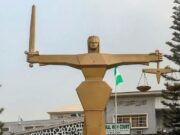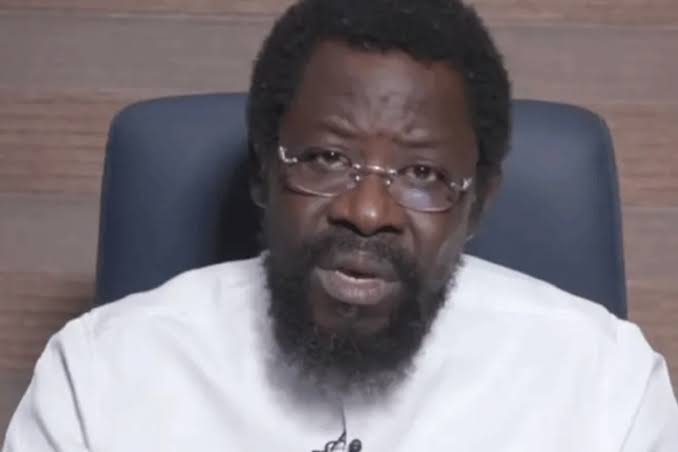The law firm of Afe Babalola has formally petitioned the Legal Practitioners Disciplinary Committee (LPDC), requesting the removal of Lagos-based lawyer Dele Farotimi from the roll of legal practitioners in Nigeria.
The petition accuses Farotimi of violating several provisions of the rules of professional conduct for lawyers.
The petition, which spans 90 pages and was dated December 6, 2024, is signed by Ola Faro, a partner at Afe Babalola & Co. Faro, who was also mentioned in Farotimi’s book, “Nigeria and its Criminal Justice System,” presented the petition both on his own behalf and on behalf of the law firm.
The petition is titled: “PETITION AGAINST TOMILOLA TITUS FAROTIMI (ALSO KNOWN AS DELE FAROTIMI ESQ), A NIGERIAN LAWYER CALLED TO THE NIGERIAN BAR WITH HIS NAME ON THE ROLL OF LEGAL PRACTITIONERS KEPT BY THE SUPREME COURT FOR VIOLATION OF THE EXTANT RULES OF PROFESSIONAL CONDUCT FOR LEGAL PRACTITIONERS RULES 1, 15(1), 15(2B), 15(3A), 15(3G), 15(3I), 15(3J),26(1), 27(1), 30, 31(1), (2) AND (4) OF THE RULES OF PROFESSIONAL CONDUCT 2023 BY BRINGING THE ENTIRE JUDICIARY IN NIGERIA INTO DISREPUTE WITH HIS UNFOUNDED ALLEGATIONS OF CORRUPTION AGAINST EMINENT JUSTICES OF THE SUPREME COURT OF NIGERIA, JUDGES OF THE HIGH COURT OF LAGOS STATE, AARE AFE BABALOLA SAN, OLU DARAMOLA SAN, OLA FARO ESQ, AND THE ENTIRE CHAMBERS OF AFE BABALOLA & CO IN HIS BOOK TITLED ‘NIGERIA AND ITS CRIMINAL JUSTICE SYSTEM.’”
Faro outlined the facts of the case and detailed the alleged violations of professional conduct rules by Farotimi.
According to the petition, Farotimi is accused of “engaging in conduct unbecoming of a legal practitioner by making false accusations against the Supreme Court and the legal profession.”
The petition further accuses Farotimi of the following violations:
“Assisting his clients in conduct that he knows to be illegal and fraudulent.”
“Knowingly engaging in illegal conduct in the course of his practice as a legal practitioner.”
“Treating fellow lawyers without respect, fairness, consideration, and dignity, allowing ill-feelings between opposing clients to influence his conduct and demeanor by distorting the facts of a case.”
“Failing to observe good faith and fairness in dealing with other lawyers in respect to a case already decided by the Supreme Court.”
“Conducting himself in a manner that obstructed, delayed, and adversely affected the administration of justice by taking steps to frustrate a decision of the Supreme Court for his personal benefit and that of his client, who lost at the Supreme Court.”
“Treating the court, particularly the Supreme Court, without respect, dignity, and honor by using uncouth, unprofessional, undignified, and offensive language against the Supreme Court and its justices.”
“Making defamatory statements against judicial officers rather than making a complaint to the appropriate authorities.”
“Indicating that he discussed a pending case with a judge trying the case in the absence of an opposing lawyer.”
The petitioners state that these violations prompted the filing of the petition to “protect the dignity of the legal profession, the dignity of the court as the temple of justice, and to uphold the standards of the legal profession.”
Furthermore, the petition emphasizes that some of the statements made in Farotimi’s book could potentially cause significant harm to the legal profession and society at large.
The allegations, according to the petitioners, were intended to “discredit the entire Nigerian judiciary, Justices of the Supreme Court, judges of the High Court of Lagos State, their law firm, and to ridicule them within the legal profession and injure their hard-earned reputation and financial credit.”
The Legal Practitioners Disciplinary Committee (LPDC) is responsible for investigating and addressing misconduct among Nigerian lawyers, ensuring adherence to ethical standards.
If the committee finds Farotimi guilty of these allegations, it has the authority to recommend that his name be struck off the roll of legal practitioners kept by the Supreme Court.
However, such a decision may be appealed to the Supreme Court.

















